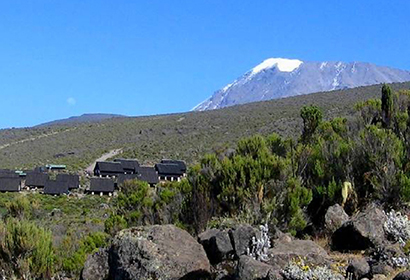Kilimanjaro Region, Tanzania
The Marangu Route also known as the “Coca-Cola Route” is the oldest and most well established trekking route on Mount Kilimanjaro, and it remains extremely popular mainly because it is the only route on the mountain that has hut accommodation for trekkers.
This path provides trekkers with the classic Kilimanjaro climbing experience, offering sweeping views and a wonderful hiking adventure all the way to the summit of Uhuru Peak. That said, it also has some unique aspects that set it apart from any of the other routes as well, giving Marangu route a character and feeling that is entirely its own.
One of the more interesting aspects of Marangu Route is that it is the only route up Mount Kilimanjaro that doesn’t allow camping, so instead of sleeping in tents, trekkers stay in permanent huts instead.

Below, you will find a comprehensive 5 night/6 day climb up Kilimanjaro via the Marangu Route. If you would like to shorten your route to 5 days, skip the night of the Acclimatization Day and continue walking straight from the Horombo Huts to the Kibo Huts in one day.
Day 1: Mandara Huts, Once you have finished breakfast, it is time to leave Arusha and head towards the southeast entrance of Kilimanjaro National Park, better known as Marangu Gate. Upon arriving at Marangu Gate, you will be given the time to check-in and register. This is where you begin your ascent of Kilimanjaro. The first leg of this route takes you through the woods and the rainforest where you will be able to take in the eucalyptus trees and various species of birds. If you are lucky, you may just spot a Colobus monkey or two – keep an eye out for black or white fur! Make sure you have the appropriate equipment and footwear because the low altitudes can produce wet, muddy soil.
Day 2: Mandara Huts – Horombo Huts, To start off day 2, you will explore the final stretch of woodland as the massive stretch of moorland begins to open up right in front of your eyes. On your walk, you can appreciate the jagged peaks of Mawenzi that ascend up towards the skies of Africa. It is common for people to experience the onset of altitude sickness at these heights. It is important to pay attention to how you feel and communicate with your guide at the first and slightest indication of illness. After reaching the Horombo Huts, you will have time to unpack and experience the view of Kibo before dinner.
Day 3 Acclimatization Day, You will spend an extra day at the Horombo Huts to allow your body to acclimate to the increasingly high altitude. You must stay at camp and relax if you are showing any signs of illness or are feeling especially tired. However, if you feel well-acclimated to the altitude, then you are free to walk up to Mawenzi Hut and admire the incredible view of Kibo and Mawenzi. Keep a steady pace and you walk the route and enjoy the magnificent landscape. Otherwise, you can take a journey to the remarkable Zebra Rocks. This requires a climb of 310 metres.
Day 4: Horombo Huts – Kibo Huts On day 4, you will walk through varied and strikingly picturesque landscapes. To begin, you will continue across the heath as it slowly turns into the parched, desolate highlands between Mawenzi and Kibo. The scenery here is littered with huge and small volcanic rocks, acting as a testament to the volcanic activity of years past. The final stretch to the Kibo Huts is very steep and physically challenging.
Once you arrive at the Kibo Huts, it is time to organize your equipment and warm clothes for tomorrow’s journey to the peak. To prevent freezing, keep any water your plan on bringing in a thermos. Get to bed early, as the next day’s trek requires a full night’s sleep worth of energy. You are getting ready to take on Kilimanjaro’s most ultimate challenge!
Day 5 Kibo Huts – Gilman’s Point – Uhuru Peak – Horombo Huts As you awake around midnight, there is just enough time for a small meal before you begin your nightly hike. Many hikers consider the difficult terrain, scattered with loose rocks, to be the most difficult part of the climb. The goal is to reach Gilman’s Point by dawn. This is to make sure that you can make it to Uhuru, the highest point of Kibo, shortly after sunrise. There will be a quick stop at Gilman’s Point to experience the glorious view. Afterward, you will continue along the edge of the crater to Uhuru – this is the last part of the ascent and features a steady incline.
Depending on when you take your journey, you may face snow on the final stretch of the path to the Uhuru Peak – the highest point in Africa and the very top of Kilimanjaro. As you reach the peak, an altitude of 5,895, you can congratulate yourself as you experience the astounding view and get a picture in front of the Uhuru Peak Sign.
Now it is time to start back towards the Kibo Huts, you will find that this part goes by incredibly quickly. At the Kibo Huts, you will stop to relax and enjoy a much-needed lunch, before moving along to the Horombo Huts, where you will enjoy a well-deserved full night’s rest.
Day 6: Horombo Huts – Marangu Gate – Arusha, As we make the final descent through the rainforest to the Marangu Gate, we will have lunch and say farewell to our mountain crew. Afterward, we will leave Mount Kilimanjaro National Park and drive back to Arusha for a much-need shower and a commemorative dinner!